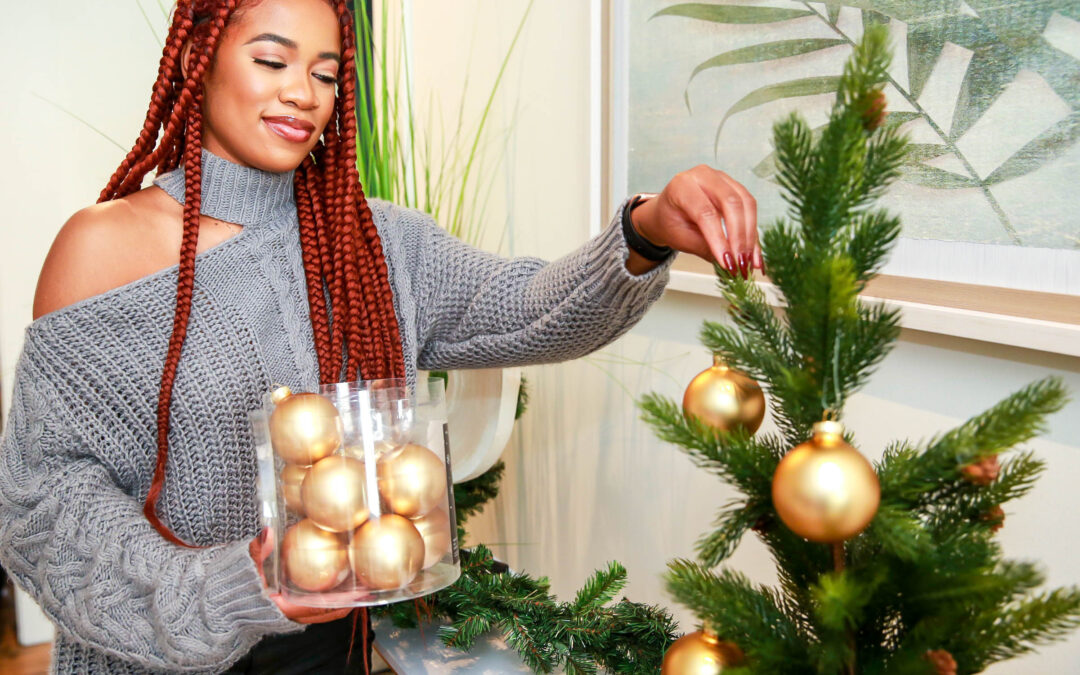November through early February are jam packed with back to back holidays that tend to consume our daily lives. Thanksgiving, Christmas, New Year’s Eve, and Valentine’s Day are known to fill our stores with festive decorations and special food, our social media timelines with trips and gatherings, and our minds with everything we have – or everything we don’t.
The holidays can be a time of joy, love, togetherness, and safety for many. However, it can also be a time of mourning, sadness, loneliness, and fear for just as many. The holidays also occur during the time of year when Seasonal Affective Disorder (SAD) tends to heighten with the days being shorter and colder. SAD is a mental health condition that mirrors symptoms of depression, though it is typically only present during certain seasons.
Putting these experiences together can lead to rather difficult emotions. Emotions that we may not know how to respond to, especially when we see others experiencing the opposite. Sadness, self-isolation, anger, grief, desperation, and the like are common if the holidays do not bring up positive memories or emotions for you. If you, or someone you know, struggle with this, then let’s talk about what to do!
Plan Ahead
Being prepared is one of the best ways to manage the difficult things that come up for us during the holiday season. When we are in the midst of feeling overwhelmed or down, it can be harder to recognize it, problem solve, strategize, and act on self care. However, if we go into the season with a concrete written coping plan, all we have to do is refer to it and act. The initial steps include 2 rather simple questions. Take an opportunity to reflect on these:
- Think to yourself, “Do the holidays make me feel (fill in the blank)?” If sadness or a similar emotion would fit, go to the next question.
- “Since I know the holidays make me feel ___. Are there specific holidays that I feel this?” (i.e. Thanksgiving, Valentine’s Day, etc.)
Now keep those holidays in mind as you read through how to prepare. Even if you are reading this and the holidays are already here, you can still plan and benefit from this information.
Opposite Action
Opposite action is one of my favorite coping strategies to teach! It is straightforward and effective. It is helpful to think of sadness, depression, and anxiety as being able to “talk” to us; it can create negative and anxious thoughts, encourage us to do or not do certain things, cause us to feel down on ourselves, and a host of other behaviors that may be out of alignment with how we want to engage or show up. They are pretty much toxic friends that seem to be hard to get rid of. So if these “friends” are telling us all of the things we should or shouldn’t do that may not be healthy for us, what can we do about it? We can “talk” back and do the opposite.
Sadness telling you to lay in bed all day and not go to the outing with your friends?
Go. Even if it’s just for a little while.
Is life typically more nuanced and has more context? For sure. Therefore, practicing discernment is key. There is a difference between avoiding an outing with friends that are not good friends and avoiding friends who support you. Similarly, there is a difference between laying in bed because you’ve had a busy week with work and this is your necessary down time versus laying in bed all day because you’re experiencing low motivation and feeling sadness.
Social Support
Speaking of friends, let’s get into utilizing social support; friends, family, co-workers, mutual friends, and social media peers all fall into this category. Feeling like self-isolating, not wanting to impose, or being a burden on others is common during this time of year.
One, ask yourself for the proof to support the thought that you may be a burden or impose. Is it rational? Is it fair to you? Should it be enough to stop you from getting the support you need?
Could you ask your support to meet up in person? What about a FaceTime or phone call? Can they just send texts every now and then to check up on you? Are there some activities you can do together? Could you come over for a meal or a movie night?
These are all ways for you to feel seen and heard.
And, if they are a good relationship to have in your life, then they would want you to feel that way. Again, we want to remain mindful of the kind of people we are reaching out to. Keep in mind:
- Is this a person who would encourage you to act in an unhealthy way?
- Is this a person who has shown they can listen to you?
- Is this a person that triggers you?
Gratitude & Positive Memories
Being reminded of the things or people you don’t have is rather easy to do. I challenge you to think of what you do have. It can be as big or small as possible. A place to live, safety, health, state of mind, job, new understanding of yourself, short-term goal that’s been accomplished, breath in your body, and the sun are examples of things you can focus on being grateful for instead.
In addition, especially if we are dealing with grief and loss, we may think a lot about the things or people that are not present. That’s okay! How can you honor them at this time? What are the great memories you have of them?
Or let’s say a relationship ended and it was for the best, but this is one of the first times you’re experiencing the holidays without them. Allow yourself to feel the joy of the positive times you had and gratitude for being in a space to focus on yourself and your needs.
If the holiday season has always been a source of pain, then it’s okay to skip thinking of memories. Maybe thinking about how you can make the future holidays more positive is better.
Decorate or Get Into Hobbies/Projects
Decorating can be a source of joy or excitement. If it’s a tradition you’d like to continue or you don’t mind having some of the festive aspects around, then go for it! Turn on some music, grab some old decorations or pick up some new ones, and allow yourself to feel the good feelings that come up. However, if you are someone who feels more comfortable not having reminders of the time of year then that is okay too!
Using this time to dive deep into your hobbies or any projects you’re working on can help. Physical exercise can be huge in improving your mood, for example. Or maybe this is your opportunity to get back into an old hobby. Could you try something new? Crocheting, painting, baking, photography, sudoku, joining a book club, and creating music playlists are just a few examples.
Give Back
You are far from alone if you have a hard time emotionally during the holiday season. One way to spend time with others and experience the joy of helping the community is to get involved in a project that gives back. There are numerous organizations in Georgia that package and deliver food to those in need, spend time with the elderly, support the youth, clean up the environment, and need help with managing donations for example. You get the opportunity to have a change of scenery/pace and connect with others who are volunteering while the community receives the benefits of the work you put in.
Start New Traditions
If you usually had traditions during the holidays and do not anymore, could you start new traditions? Traditions have a way of allowing people to create and sustain identities, honor and love themselves or others, and have something special to look forward to. Creating a new tradition could give you a sense of comfort and familiarity while being in the midst of the holiday season. It adds a spotlight to a certain experience that brings you joy. Don’t be afraid to be creative, innovative, or borrow ideas from others.
Journal and Distract
 Journaling is an excellent way to process and release the emotions and thoughts you may be having without worrying about being judged or managing another person’s reaction. Journal about how you’re feeling, why, who you’re thinking about, or what you can do differently moving forward.
Journaling is an excellent way to process and release the emotions and thoughts you may be having without worrying about being judged or managing another person’s reaction. Journal about how you’re feeling, why, who you’re thinking about, or what you can do differently moving forward.
For some, journaling helps but, even after doing so, they still have discomfort this time of year.
It’s okay to distract yourself.
A major benefit of journaling before distracting is that you’re not avoiding your feelings, you’ve allowed yourself time to acknowledge them and now you are coping with what is left over. You can distract yourself with tv/movies, brainteasers, conversations with others, going for a mindful walk, visiting your favorite restaurant, and the list goes on. The key is identifying something you enjoy or used to enjoy and giving it a try. If that doesn’t work, try something else (that is safe!).
Note: Beware of substance use and self-harming behaviors as distractions. Make every effort to utilize skills that are less risky.
Below, is a fictional example of what a plan could look like using the aforementioned tips.
Example of a plan to cope through the holidays:
Feelings: Loneliness and sadness
Triggering Holiday: Thanksgiving
Sunday 11/20/22: Lightly decorate at home, pick out movies/tv shows to watch, and look into volunteer options
Monday 11/21/22: Hang out with friends before they leave to spend time with their families. Ask Monique if she will check on me on Wednesday and Thursday. Ask Jess if she will check on me on Friday
Tuesday 11/22/22: Focus on work, but check in with myself when I get home. Use a coping skill/distraction technique or journal if needed
Wednesday 11/23/22: Clean up and spend the day self-caring (face mask, burning candles, watching favorite tv shows/movies). Keep social media scrolling to a minimum.
Thursday 11/24/22: Have my favorite breakfast, journal about missing my loved one, and go to a volunteer activity. Make a gratitude list and check-in with friends that made themselves available to me.
Friday 11/25/22: Visit my favorite restaurant and go for a walk
All in all, if you are someone who struggles during the holiday seasons, I want you to remember that you have options to improve your experience (even if it’s only a little relief). I encourage you to develop a plan, lean on your social support, start new traditions or continue old ones, journal and distract yourself, give back to others, or focus on gratitude.
You have the opportunity to dictate what your reality looks like and how much it impacts you. I won’t pretend that it will all be easy. It could feel like an uphill battle, however, you won’t know until you try. You are more tenacious than sadness, grief, depression, and anxiety.
If you believe that you could benefit from additional support from a licensed professional then I would encourage you to do so. Your grief or difficulty during the holidays is not too small to speak with a therapist about. Together, you could develop a plan and they can hold you accountable to it. Or you could process what comes up for you and learn more about the mental health experiences you are having.
The Worth, Wisdom and Wellness Center provides Trauma & EMDR therapy, Therapy for Perfectionism and Low Self-esteem, Therapy for Anxiety and Depression, and Faith-Based Therapy to Black women and Women of Color. We are dedicated to being a safe space for Black women to dispel the misconceptions that they’ve heard about therapy and truly experience the benefits of healing.
If you are located in the state of Georgia* and interested in starting your healing journey, you can follow any of the steps below.
- Contact us to schedule your first session and learn more about our services.
- Review our About Us page to learn more about our trauma trained providers.
- Review our FAQs page to learn more about therapy at our center.
We look forward to being a part of your healing journey.
*Dr. Marcuetta Sims also sees clients in other states. Check her bio to learn more.

